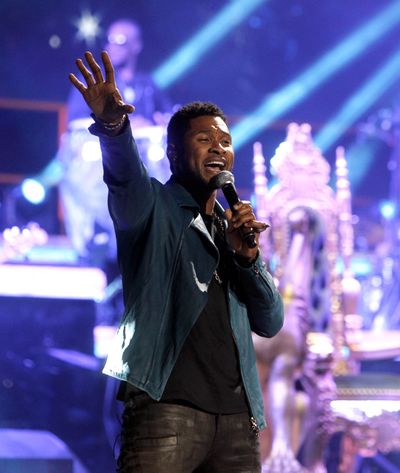Evolving Usher
R&B star finds fresh groove with latest album

LOS ANGELES – “Evolve or evaporate” is one of Usher’s favorite phrases. But it’s also a mantra that has served the R&B artist well over his 20-year career.
At 33, Usher still remains the most viable heir to the late King of Pop’s throne despite the emergence of more youthful sing-and-dance prodigies like Justin Bieber (whom he mentored) and Chris Brown (his stiffest competition).
At a recent rehearsal in Burbank’s CenterStaging, Usher (born Usher Raymond IV) barely broke a sweat – even after performing a series of back flips to his current single “Scream.”
Driven by an aggressive four-on-the-floor rhythm and infectious chorus, the Max Martin-produced single explores the Euro-pop terrain he briefly touched with 2010’s “Raymond v. Raymond,” and its extension, “Versus.”
The current influx of global, electronic dance music in pop music provided the foundation for his new and seventh album, “Looking 4 Myself” (out now). It’s another example in which the multi-platinum, Grammy Award winner meshed his old-school R&B and urban textures with fresh influences.
“I went to Coachella. I went to Ibiza, Korea, Asia and South America. I heard all these different types of music,” he said, perched in a lounge. “As I went city to city, country to country, I would turn on the radio, see what the DJ was doing and of course paid attention to what was happening in terms of sales. Electronic music had become more relevant, and DJs had become more significant in breaking sounds.”
Past smashes such as “OMG,” “DJ Got Us Fallin’ in Love” and the recent David Guetta collaboration, “Without You,” may have opened him up to a worldwide audience, but it also generated criticism from older fans who felt he’d strayed too far.
“I listen to so many styles of music that people don’t know,” he said. “If I attempt to do something that I did before … sure, people would be happy with it. But I’m never complacent.”
His last album, “Raymond v. Raymond,” was a comeback of sorts for the Atlanta native, who kicks off his tour this fall in Seattle on Nov. 10. It presented him in the lothario role his female fans craved and fueled speculation that the title and biting single “Papers” referenced a contentious divorce from Tameka Raymond, mother of his two children.
That voyeuristic intrigue helped the album bow at No. 1, a relief to those who felt his stock might have plummeted after so-so sales of 2008’s “Here I Stand.” His behemoth, 2004’s “Confessions,” was another self-referential disc that sold more than 10 million copies, according to SoundScan – a number only recently eclipsed by Adele.
With Usher’s heated custody battle with his ex garnering headlines, he’s aware some listeners expect a soundtrack to his personal drama. He’s just not willing to play into it.
“I don’t really talk about it,” he said casually. “I do find inspiration in things that I’m going through emotionally and pull from it, but I’m not as literal as people think. However, on this album there were a few songs that were really deep that I choose to share.
“Part of it is the fact that I don’t talk a lot, even though I talk a lot,” he laughs, an obvious nod to past interviews. “Or maybe they don’t listen.”
“Looking 4 Myself’s” lead single, “Climax,” is an example of paying attention. On first listen, the Diplo-produced slow-burner unraveled like one of Usher’s woozy bedroom jams, with his seductive and soulful falsetto effortlessly riding a dripping downbeat from the experimental producer. In reality, though, the single explored a relationship’s bitter demise. Offered as a free gift to fans via Twitter for Valentine’s Day, “Climax” didn’t adhere to an expected club-banger formula.
“He wanted to do something that signaled where music is going, and how the genre that he does isn’t as defined as it was in the past,” said RCA Music Group’s Chief Executive Peter Edge. “He wanted to try to infuse really great soul music like Marvin Gaye, with the most interesting new beats. I was blown away.”
“Climax” isn’t the album’s only risk. Usher also employed a list of first-time collaborators. Diplo scored two tracks, and he tapped Empire of the Sun’s Luke Steele, Noah “40” Shebib and Swedish House Mafia. Even frequent collaborators Pharrell Williams, Danja and Rico Love pushed the edges.
“If you came with your norm, it didn’t work. It just didn’t fit. The producers were challenging themselves,” Usher said. “I told Diplo, ‘Why don’t you give me tracks that you like? Don’t give me the things that you think I like.’”
Finding his footing creatively and assuming control over his career was the priority for Usher, according to RCA president of urban music/Bystorm Entertainment Mark Pitts, who has worked with the artist for 20 years.
“(Before) he didn’t take a lot of risks,” Pitts said. “When we first started, I was a little nervous. ‘Climax’ is when it came together. It was a sound that was across the waters, but it was a melody that was his core.”
“The Usher of today is standing by his decision of wanting to do something different,” Pitts added. “No matter what, he stood by it.”
Back at CenterStaging, Usher toweled himself off after rehearsing “Scream” five more times with his dancers in preparation for a performance during the recent E3 convention.
The night is long from over. He will trot to another studio to rehearse late into the night with his band.
After catching his breath, Usher flashes a smile and signals another go, this time belting out the song a cappella. He still hasn’t found himself (“you never really stop looking”), but he’s satisfied with this evolution.
“I always approach things like I’m new at it,” he said. “It’s funny because people tell me I act like I haven’t sold records before. But in my mind, every album is a restart and a rebirth.”